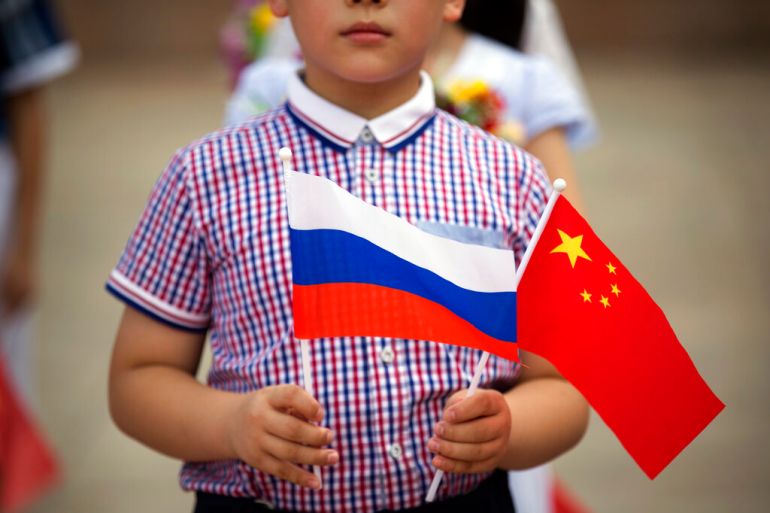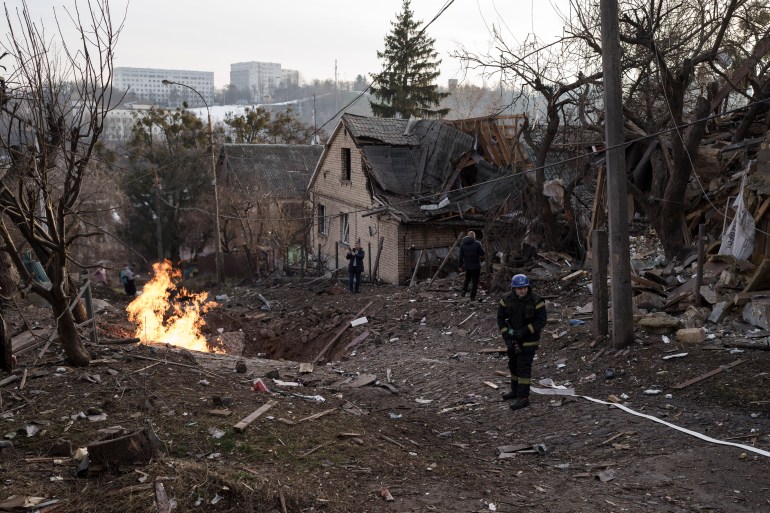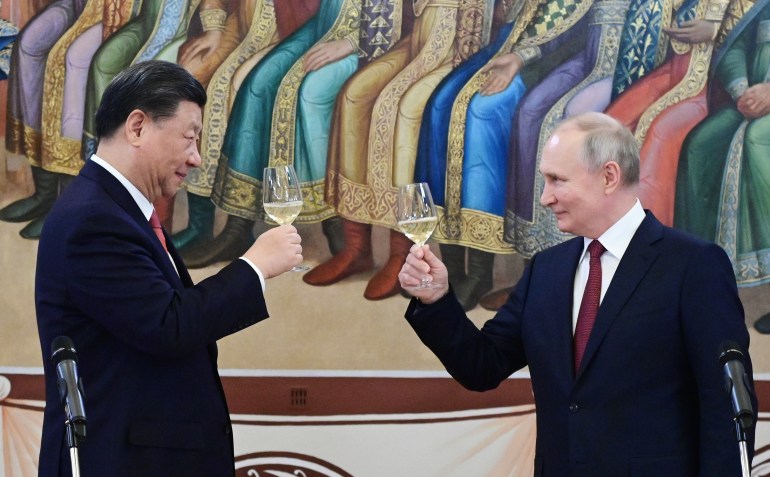Russian ‘invasion was wrong’: Views from China on war in Ukraine
As the war in Ukraine grinds on, some in China have abandoned their initial support for Russia and Putin.

Liu-wen Fang’s tears flowed when she saw the first images of Kyiv under attack and on fire as Russian forces invaded Ukraine in February 2022.
The 26-year-old had supplemented her degree in business with an exchange year in the Ukrainian capital in 2018 where she studied the Russian and Ukrainian languages at a big university.
Keep reading
list of 4 itemsXi Jinping says China and US must ‘find ways to get along’
Xi Jinping to visit Moscow for summit with Putin: Report
China’s Xi Jinping to visit Russia next week, says Kremlin
During that year, she grew very fond of Kyiv and its people. She remembers walking the city’s winding riverbanks and visiting its spacious parks, sharing cocktails with friends in its charming bars, and having dinner parties in homes like those she now watched being turned to charred ruins by Russian missiles.
“It was very hard to see the city that had been my home turned into a war zone,” Fang* told Al Jazeera from her home in Shanghai.
Before the invasion, Fang had held a quite positive view of Russia and President Vladimir Putin. After the invasion, that all changed.
“What I saw and what I heard from my Ukrainian friends about their lives being destroyed because of Putin’s imperialistic fantasies meant that I lost all my support and respect for Russia and for Putin,” she said.
Fang knows that her critical views of Russia are unique, particularly in the context of China’s deeply censured news media environment and especially when it comes to the war in Ukraine. Yet, more than a year after the invasion, there are signs that the perspectives of everyday Chinese people are shifting towards Russia’s war in Ukraine and China’s view of Putin.
China’s waning support for Russia?
Hsia-Liang Hou, 41, from Chengdu province in central China recently re-evaluated his views of Russia and Putin.
For years, he had seen Russia as a country with a powerful military and Putin as a strong and intelligent leader who dared to stand up to the West and NATO.
But after more than a year of war without a decisive Russian victory, Hou said he has started to see the invasion of Ukraine as a display of Russian weakness rather than its strength.
“Russia is much bigger than Ukraine in so many ways, and they had all the advantages in the beginning, but they still didn’t get very far on the battlefield,” he told Al Jazeera.
When Hou first heard that Russian forces had entered Ukraine, he saw it as retaliatory action by Moscow designed to decisively and swiftly strike back at NATO and the United States. After all, NATO had wanted to encircle China and Russia, and Putin ”has been one of the few leaders that have fought back against this”, he said.
But Russia’s lack of success in Ukraine has made him re-evaluate whether the threat from NATO was as pressing and as imminent as he had thought.
“If NATO is such a big threat to their country’s survival, then why aren’t the Russians fighting harder?” he asked.
Tai-Yuan Wan had also thought Russia’s invasion was justified because of what he believed was a scheming US and an aggressive NATO working to gain more and more power closer and closer to Russia.
But, as fighting continues into a second year, it seems like Russian forces are not really trying to ”save Ukraine”, as Moscow has maintained, he said.
Russia ”now just wants to burn the country to the ground, which I don’t support,” Wan told Al Jazeera from the Chinese capital, Beijing.

Wan also does not support Russia’s recently announced plans to station nuclear weapons in Belarus.
“I think that is a very aggressive step and a threat to world peace, and it makes me think that Russia is starting to act much more aggressively in this conflict than the West,” Wan said.
Wan, Hou and Fang all said that they rarely discuss the war in Ukraine with their friends and family in China.
Many Chinese people do not feel the war impacts their lives, so they do not stay up to date on events and have very little to say about it, Wan explained.
People in China also receive very different information about the war, depending on where they get their news, said Fang, explaining that opinions about the war depend on whether they get news “from Chinese media or whether they get news from some foreign media too”.
“That makes it difficult to discuss the topic,” Fang said.
Wan, Hou and Fang said they had noticed that more Chinese people were starting to view the war as a Russian mistake.
Yet, Hou believed most still sided with Russia in the conflict.
Hou’s view is supported by a Carter Center China Focus survey conducted last April on Chinese public opinion regarding the war in Ukraine. That survey found that about 75 percent of respondents agreed that supporting Russia in Ukraine was in China’s best interest.
Wan, however, disagreed.
“I think most people in China today believe that the invasion was wrong,” he said.
Wan’s belief is backed by a newer survey released in November by the Japanese think tank Genron NPO, which found that about half of Chinese respondents expressed some level of opposition to Russia’s invasion.
The more recent survey might indicate that sentiment in Chinese society is shifting away from support for Russia’s actions in Ukraine.
China should be neutral
No such shift appears to have taken place in terms of President Xi Jinping’s policies towards Russia or his opinion of Putin.
That the Chinese leader stands side-by-side with the Russian president was made clear when Xi arrived in Moscow for a three-day visit from March 20 to 22.
During the visit, the two leaders expressed condemnation of the US’s conduct on the international stage and showcased their intentions to deepen ties on a wide range of topics from trade to military affairs.
Su-Mei Chen from Shanghai said she was disappointed by the outcome of Xi’s Russian visit.
The 30-year-old told Al Jazeera she was already sceptical of the Chinese government’s 12-point peace plan for the war in Ukraine unveiled on the anniversary of Russia’s invasion. Chen saw the plan as mostly favouring Russia.
She had hoped Xi’s visit would result in more realistic steps towards ending the war.
“The only positive thing about China keeping close ties with Russia after the invasion was that China could potentially pressure Russia to find a peaceful solution,” she said.
“But Xi hasn’t even spoken to the Ukrainians and he expands cooperation with the Russians, so now it just looks like China is completely on Russia’s side in the war,” she added.

China standing so resolutely with Moscow is not favoured even by some Chinese people who support Russia, such as 48-year-old Kou-Tong Wong from Shenzhen.
“I hope Russia wins the war but this is not a conflict that has anything to do with China, so we shouldn’t send weapons or soldiers to fight in it,” he told Al Jazeera.
Despite very favourable Chinese media coverage of the Russian perspective on the war, Chen believes there is a general reluctance among everyday Chinese people for Beijing to give unconditional support to Moscow.
“This is because many Chinese people see China as a peaceful nation that doesn’t interfere in faraway conflicts, and also because the ties between Chinese people and Russian people are weak,” she said.
Chen’s point contrasts sharply with Putin and Xi’s relationship. Both leaders had repeatedly touted the deepening bonds between China and Russia during Xi’s Moscow visit.
But none of the people interviewed by Al Jazeera believed that Xi’s relationship with Putin reflected the general relationship between Chinese and Russian people.
“I think it is mostly a political alliance of convenience between two governments and not an expression of a deep bond between two peoples,” said Fang, the former exchange student in Ukraine.
“Even if there was a strong bond between Chinese and Russians, that is not a guarantee for anything,” she added.
”The deep kinship between Russians and Ukrainians didn’t protect them from fighting a war with each other.”
* The names of the interviewees have been changed to protect their identities.